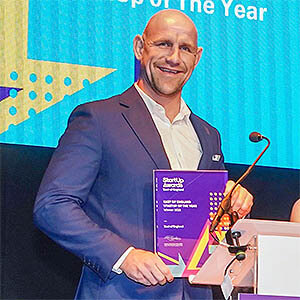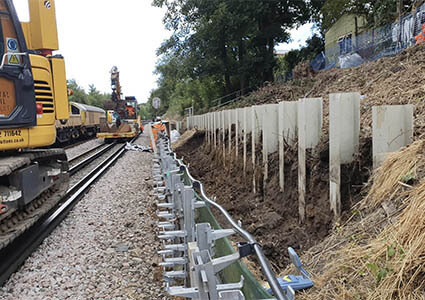
Will Temperley, Founder of Fortis Foundations shares his thoughts on the state of the civils sector
Can we start with an introduction to you, your career history, and how you came to found Fortis Foundations?
I’m Will Temperley, Founder of Fortis Foundations. Fortis Foundations provides civil engineering products and services, with expertise in foundations and piling, to the rail, civils, energy, residential and water sectors.

My inspiration to start the business began shortly after leaving my first long-term employer after 17 years in 2018. The company had recently been sold and we had the choice to take voluntary redundancy. Many of my colleagues took this opportunity and left, however I believed in the company’s vision at that time and decided to stay to help guide them into the future. I soon regretted this decision when I realised our visions did not align. I began talks with my wife, Alice, about creating our own company and that is when Fortis was born. Alice spent hours researching potential fits for our business and eventually found the name Fortis, which is Latin for strong, bold and brave and fitted our new venture perfectly.
What aspect of the business do you enjoy the most and why?
I’m most passionate about problem-solving. It’s the heart of our work, as we tackle complex challenges to design and build infrastructure. Finding innovative solutions and witnessing their tangible, lasting impact is incredibly rewarding. The industry we’re in is dynamic and constantly evolving with new technologies and materials, which keeps the work both engaging and exciting.
What benefits have your clients experienced since partnering with Fortis Foundations?
The team brings over 20 years of rail and construction industry experience, providing expert advice and cost-effective solutions to clients from all sectors looking for experts that they can rely on. At Fortis, we really want to be known as a company that delivers safe and sustainable solutions at the forefront of innovation and technology, ensuring the highest quality results every time.
The benefits that our clients have experienced are numerous and often tailored to their specific needs and projects. Some of the common benefits are:
- Two-way communication: our clients get reassurance from our competent staff and a one-to-one service from our management team.
- Cost savings: effective project management and efficient design have resulted in cost savings for our clients.
- Enhanced safety: our team puts safety first, thereby reducing risks and hazards.
- Environmental sustainability: we focus on sustainable practices, leading to reduced environmental impact and energy efficiency.
- Long-term reliability: clients can rely on our expertise to ensure the longevity and durability of their infrastructure, thereby reducing maintenance costs over time.
Could you elaborate on your sister organisation, Fortis EV?
Starting an EV business requires a combination of industry knowledge, financial resources, and a commitment to sustainability. It’s also important to be adaptable and open to change in this fast-moving industry. Fortis EV came to us naturally; we were building a network of industry contacts and staying informed about technological advancements, and we had the knowledge to install the infrastructure required. It gives the business that additional edge, and it’s something we’re extremely excited about.
 What industry changes have you seen in recent years?
What industry changes have you seen in recent years?
Recent industry changes in civil engineering include:
- Digital transformation: this includes the adoption of BIM and AI for project efficiency.
- Sustainability focus: the civils sector is increasingly committed to green building and constructing resilient infrastructure.
- Renewable energy and electric mobility: this industry is working to adapt infrastructure to support renewables andelectric vehicles.
- Transportation changes: organisations are preparing for autonomous vehicles and mobility shifts.
What would you say are the challenges facing the industry, and what strategies do organisations need to ensure are in place to tackle them?
The civil engineering industry is facing many challenges:
- Skills shortage: it’s imperative to address the skilled labour shortage through training initiatives.
- Aging infrastructure: maintenance must be prioritised, and the relevant bodies need to secure funding for aging structures.
- Technological advancements: investing in technology and innovation to stay current is essential. AI will work in partnership with people for a time, but then will potentially diminish the need for specific job roles.
- Environmental regulations: civil engineering firms have a duty to stay compliant with evolving environmental regulations.
- Building legislation: the concept of a 125-year life span for buildings is gaining ground as a sustainability goal, however digital systems and smart construction technologies will be in place within a year or two and will save time and a third of the cost of life span initiatives.
What should be top of the agenda for construction leaders today?
Net Zero targets, such as the installation of 300,000 EV charging installations and a target of building 300,000 homes annually, should be high on the priority list for construction leaders for many reasons including the reduction of carbon emissions, job creation, innovation and sustainability.